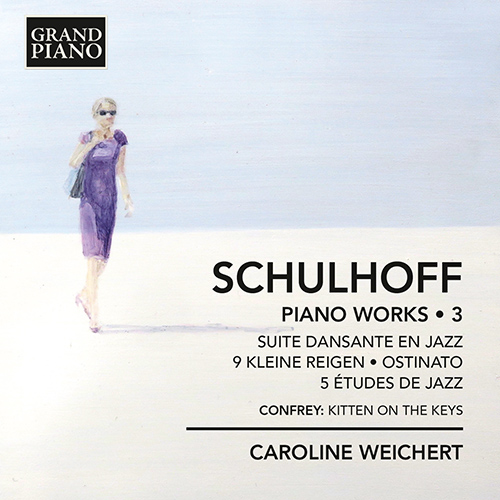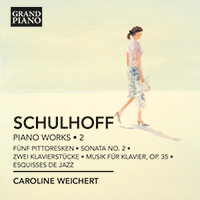
About this Release
“I fell in love with Schulhoff almost 10 years ago and it took me some times to get through all of his works and fully understand his language and underlying message. As I went through the process I discovered that the affinity between my concept of music and “Weltanschauung”and his work was growing stronger and stronger. The decision to publish his complete piano works was therefore a logical consequence. His music can be profound and entertaining, ironic and tragic, structurally complicated and easy to understand, and all at the same time. This third volume of Erwin Schulhoff's complete piano works offers, for example, a unique opportunity to hear the original “Kitten on the Keys” ragtime of Zez Confrey (track 27) and Schulhoff’s distinctive arrangement on track 26, rooted in his own classical training and background.” — Caroline Weichert
SCHULHOFF, ERWIN (1894–1942)
Piano Works • 3
Suite dansante en Jazz • Neun kleine Reigen • Ostinato • Cinq Études de Jazz
- Caroline Weichert, piano
Spanning almost two decades of Schulhoff’s output, this programme includes the rarely heard Neun kleine Reigen, one of the composer’s earliest works to exhibit the influence of both jazz and light music, as well as Suite dansante en jazz, one of the last of his works to be overtly indebted to jazz idioms. The six intimate and humorous portraits of everyday life with a child which make up Ostinato show the influence of Expressionism and Dada. The album concludes with Zez Confrey’s ragtime Kitten on the Keys to which Schulhoff pays his own tribute in the last movement of Cinq Études de Jazz.
This recording was made on a modern instrument: Steinway, Model D
Tracklist
|
Schulhoff, Erwin
|
|
Suite dansante en jazz (1931) (00:14:00 )
|
|
1
I. Stomp (00:01:01)
|
|
2
II. Strait (00:03:22)
|
|
3
III. Waltz (00:04:23)
|
|
4
IV. Tango (00:02:33)
|
|
5
V. Slow (00:03:43)
|
|
6
VI. Fox-trot (00:01:58)
|
|
9 kleine Reigen, Op. 13 (1913) (00:15:34 )
|
|
7
No. 1. Leicht bewegt (00:01:47)
|
|
8
No. 2. Massig bewegt (00:01:24)
|
|
9
No. 3. Schnell (00:00:38)
|
|
10
No. 4. Feurig, aber sehr rhythmisch (00:00:50)
|
|
11
No. 5. Walzertempo, äusserst kokett vorzutragen (00:03:01)
|
|
12
No. 6. Ruhig fliessend (00:02:36)
|
|
13
No. 7. Ruhiges Walzertempo (00:01:59)
|
|
14
No. 8. Leicht bewegt (00:01:20)
|
|
15
No. 9. Ruhiges Walzertempo (00:02:15)
|
|
Ostinato (1925) (00:07:00 )
|
|
16
I. Papa (00:01:32)
|
|
17
II. Mama (00:01:37)
|
|
18
III. da....da (00:01:07)
|
|
19
IV. hopp....hopp (00:00:48)
|
|
20
V. a....a (00:01:06)
|
|
21
VI. trara (00:01:06)
|
|
5 Études de jazz (1926) (00:12:00 )
|
|
22
No. 1. Charleston (00:01:29)
|
|
23
No. 2. Blues (00:03:20)
|
|
24
No. 3. Chanson (00:03:35)
|
|
25
No. 4. Tango (00:01:56)
|
|
26
No. 5. Toccata sur le shimmy 'Kitten on the keys' de Zez Confrey (00:02:56)
|
|
Confrey, Zez
|
|
27
Kitten on the Keys (1921) (00:03:51)
|
The Artist(s)

Caroline Weichert was a pupil of Renate Kretschmar-Fischer at the Musikhochschule in Detmold, and also studied with Conrad Hansen, Vitaly Margulis and Yvonne Lefébure. A prizewinner at the Busoni, German Chopin and Schubert competitions, she has appeared regularly as a soloist with orchestras such as the Baden-Baden Philharmonie, Nordwestdeutsche Philharmonie and the Telekom-orchester. She received a Discobole award from the Académie du Disque Français for her recording début featuring works by Shostakovich. Weichert’s first recording for Grand Piano, Schulhoff’s Piano Works Volume 1, received wide critical acclaim, including the prestigious Choc de Classica and Pianiste magazine’s Maestro awards.
The Composer(s)
 Erwin Schulhoff was born in Prague on 8 June 1894 and showed musical ability from an early age. A musical career was decided upon on the recommendation of no less than Antonín Dvorák, and Schulhoff studied at the Prague Conservatory from 1904, followed by piano tuition in Vienna from 1906 then composition in Leipzig with Max Reger from 1908 and subsequently in Cologne with Fritz Steinbach from 1911. In the meantime he had laid the basis of a career as a pianist, while his efforts at composing were rewarded with the Mendelssohn Prize in 1918 for a piano sonata. His music up to the First World War had shown the expected influences from Brahms and Dvorák, and by way of Strauss, to Debussy and Scriabin, but four years in the Austrian army saw him adopt a more radical stance artistically and politically. In the next few years he absorbed the values of the Expressionism represented by Schoenberg and the Second Viennese School as well as the Dadaism espoused by Georg Grosz, whose advocacy of jazz was to find its way into much of Schulhoff’s music from that period.
Erwin Schulhoff was born in Prague on 8 June 1894 and showed musical ability from an early age. A musical career was decided upon on the recommendation of no less than Antonín Dvorák, and Schulhoff studied at the Prague Conservatory from 1904, followed by piano tuition in Vienna from 1906 then composition in Leipzig with Max Reger from 1908 and subsequently in Cologne with Fritz Steinbach from 1911. In the meantime he had laid the basis of a career as a pianist, while his efforts at composing were rewarded with the Mendelssohn Prize in 1918 for a piano sonata. His music up to the First World War had shown the expected influences from Brahms and Dvorák, and by way of Strauss, to Debussy and Scriabin, but four years in the Austrian army saw him adopt a more radical stance artistically and politically. In the next few years he absorbed the values of the Expressionism represented by Schoenberg and the Second Viennese School as well as the Dadaism espoused by Georg Grosz, whose advocacy of jazz was to find its way into much of Schulhoff’s music from that period. Reviews
“I must say that Weichert gives every piece that Stott herself recorded even more of a jazz swagger.” – The Art Music Lounge
“One can imagine all of those “piano gods” up in heaven looking down approvingly on Weichert and perhaps even persuaded that Schulhoff, indeed, had a thing or two to bring to the jazz party.” – Examiner.com
“The outstanding German pianist, Caroline Weichert, captures the many moods of jazz to perfection, the clarity of busy hands being exemplary, while the recording quality—as with the earlier discs—is among the most realistic piano sounds you will find on disc.” – David’s Review Corner



 Grand Piano has gained a reputation for producing high quality recordings of rare keyboard gems. Dedicated to the exploration of undiscovered piano repertoire, the label specialises in complete cycles of piano works by many lesser-known composers, whose output might otherwise have remained unknown and unrecorded.
Grand Piano has gained a reputation for producing high quality recordings of rare keyboard gems. Dedicated to the exploration of undiscovered piano repertoire, the label specialises in complete cycles of piano works by many lesser-known composers, whose output might otherwise have remained unknown and unrecorded.






